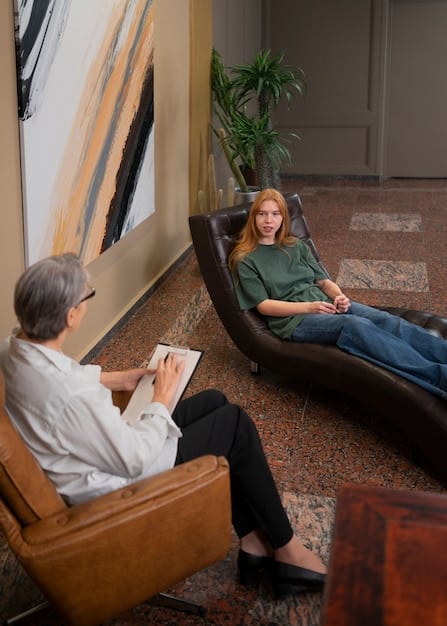Find a Qualified Couples Therapist in Your Area: A Guide

Finding a qualified couples therapist involves meticulous research into their credentials, specializations, therapeutic approaches, and practical considerations like licensing and ethical practices, ensuring a beneficial partnership for relationship growth.
Embarking on the journey of couples therapy can be a transformative step for any relationship seeking growth and resolution. Learning How to Find a Qualified Couples Therapist in Your Area: A Guide to Credentials and Specializations is crucial for ensuring that the therapeutic process is both effective and ethically sound. This comprehensive guide aims to demystify the search, empowering you with the knowledge needed to make an informed decision for your relationship’s health.
Understanding the Landscape of Couples Therapy
The decision to seek couples therapy often marks a pivotal moment in a relationship, signaling a commitment to address challenges, improve communication, or rekindle connection. However, the sheer volume of choices and varied therapeutic approaches can be overwhelming. This section aims to provide a foundational understanding of what couples therapy entails and why selecting the right professional is critically important for successful outcomes.
Couples therapy is a specialized form of psychotherapy designed to help partners improve their relationship. It involves structured sessions with a trained therapist who acts as a neutral third party, guiding partners through difficult conversations and providing tools for healthier interaction. The goal is not just to resolve conflicts but to foster a deeper understanding, empathy, and respect between individuals. When searching for a therapist, it’s essential to consider whether they are equipped to handle the specific dynamics and issues present in a relationship. A therapist’s experience with certain relationship issues, such as infidelity, financial stress, or parenting conflicts, can significantly influence the effectiveness of the therapy.
Furthermore, the therapeutic process often unveils complex emotional patterns and historical influences that shape the relationship dynamic. A qualified therapist possesses the expertise to navigate these intricacies, ensuring that both partners feel heard, validated, and safe throughout their journey. Without a skilled guide, therapy can sometimes exacerbate existing issues or fail to achieve meaningful progress. Therefore, understanding the therapist’s methodology and ensuring it aligns with the couple’s needs is paramount.
What to look for in a couples therapist
When beginning your search for a couples therapist, an initial step should be to identify what specific issues you hope to address. Is it communication breakdowns, recurring arguments, or perhaps a sense of growing apart? Clarifying these objectives will help narrow down your options. Once you have a clear picture, you can start evaluating potential therapists based on several key criteria.
One of the first practical considerations is the therapist’s professional background. This includes their educational qualifications, which should ideally be a master’s or doctoral degree in a relevant field such as marriage and family therapy, psychology, or social work. Look for therapists who have pursued specialized training in couples therapy approaches, like Emotionally Focused Therapy (EFT) or the Gottman Method. These specialized trainings demonstrate a focused commitment to working with relational dynamics.
- Review their educational background and degrees earned.
- Check for specific certifications in couples therapy modalities.
- Look for active licenses with state regulatory boards.
Beyond academic credentials, consider the therapist’s approach to client care. A therapist who listens attentively, offers insightful observations, and facilitates balanced discussions between partners is often more effective. It is also beneficial if the therapist provides clear guidelines on confidentiality, session structure, and emergency protocols, ensuring professionalism and trust. The initial consultation is an excellent opportunity to assess the therapist’s communication style and overall demeanor, and to determine if their approach resonates with both partners.
Credentials and Licensing: The Foundation of Trust
When selecting any healthcare professional, credentials and licensing act as fundamental indicators of their competence and ethical standing. For couples therapy, this is particularly vital, as you are entrusting someone with the intimate details and vulnerabilities of your relationship. This section delves into the specific qualifications therapists should possess and how to verify them, ensuring you choose a practitioner who is legally and professionally equipped to guide your journey.
A qualified couples therapist will typically hold specific academic degrees and state-issued licenses. In the United States, common licenses for couples therapists include Licensed Marriage and Family Therapist (LMFT), Licensed Professional Counselor (LPC), Licensed Clinical Social Worker (LCSW), or Psychologist (Ph.D. or Psy.D.). Each of these licenses requires extensive education, supervised clinical experience, and successful completion of rigorous examinations. The specific requirements can vary by state, but the underlying principle remains consistent: ensuring the practitioner meets a high standard of professional competency.
It’s important to understand the differences between these licenses. An LMFT, for example, has specialized training in systemic approaches to relationships and family dynamics, often making them a top choice for couples therapy. LPCs and LCSWs might also have significant experience with couples, but their core training might be broader. Psychologists, with their doctoral degrees, offer a deep understanding of human behavior and mental health, which can be invaluable when individual psychological issues impact the relationship. Regardless of the specific license, verifying its active status with the relevant state board is a non-negotiable step.

Verifying a therapist’s credentials and standing
The process of verifying a therapist’s credentials is straightforward and can typically be done online. Every state in the US has a licensing board responsible for regulating mental health professionals. These boards maintain public databases where you can look up a therapist by name and check their license status, educational background, and any disciplinary actions.
When you access these databases, pay attention to the license number, its issue date, and its expiration date. An active and up-to-date license indicates that the therapist meets current state requirements and is authorized to practice. It’s also wise to check if the therapist is affiliated with professional organizations. Organizations like the American Association for Marriage and Family Therapy (AAMFT) or the American Psychological Association (APA) often require members to adhere to strict ethical guidelines and engage in ongoing professional development. While not a substitute for state licensing, membership in these bodies adds an additional layer of credibility.
- State licensing board websites (e.g., California Board of Behavioral Sciences, New York State Office of the Professions).
- Professional association directories (e.g., AAMFT, APA).
- Third-party credential verification services (often used by insurance companies).
Beyond the formal checks, consider asking the therapist directly about their qualifications during an initial consultation. A transparent and qualified professional will be happy to discuss their training, therapeutic approach, and experience. This direct engagement can provide valuable insights into their professionalism and whether they are a good fit for your specific needs. Trust in a therapist begins with confidence in their foundational competence, and rigorous credential verification is the cornerstone of that trust.
Specializations in Couples Therapy Approaches
Just as medical doctors specialize in different areas of the body, couples therapists often specialize in various therapeutic approaches, each with its unique philosophy and techniques. Understanding these specializations is key to finding a therapist whose methodology aligns with your relationship’s specific needs and the issues you wish to address. This section explores some of the most common and effective specializations within couples therapy, providing a deeper insight into their methodologies and benefits.
One of the most widely recognized and research-backed specializations is Emotionally Focused Therapy (EFT). Developed by Dr. Sue Johnson and Dr. Les Greenberg, EFT focuses on the emotional bonds within a relationship. It helps couples identify negative interactional patterns fueled by underlying emotional needs and fears, often related to attachment. By helping partners understand and express these deeper emotions, EFT aims to foster more secure and loving connections. Therapists trained in EFT typically guide couples to de-escalate conflicts, restructure interactions, and create new, healthier emotional experiences.
Another highly respected specialization is the Gottman Method Couples Therapy, founded by Drs. John and Julie Gottman. This approach is based on decades of research into what makes relationships succeed or fail. The Gottman Method focuses on improving verbal communication, increasing intimacy, respect, and affection, removing barriers to empathy, and reducing conflict. It provides practical tools and exercises for couples to build a “Sound Relationship House,” emphasizing friendship, conflict management, and shared meaning. Therapists using this method often incorporate questionnaires and structured exercises to help couples identify and address specific areas of their relationship.

Other notable therapeutic specializations
While EFT and the Gottman Method are prominent, other specializations offer diverse pathways to relationship health. These include Cognitive Behavioral Therapy (CBT) for couples, which helps identify and change negative thought patterns and behaviors that contribute to relationship problems, and psychodynamic therapy, which explores how past experiences and unconscious processes impact current relationship dynamics.
Additionally, some therapists specialize in more niche areas such as sex therapy, which addresses sexual dysfunction and intimacy issues within the relationship framework, or family systems therapy, which views the couple’s issues within the broader context of their family history and dynamics. Narrative therapy, on the other hand, helps couples reframe their relationship narrative in more positive and empowering ways. Each specialization offers a unique lens through which to understand and resolve relational challenges.
- Solution-Focused Brief Therapy (SFBT): Emphasizes present and future goals, focusing on solutions rather than problems.
- Imago Relationship Therapy: Aims to help couples understand childhood wounds and how they manifest in adult relationships, fostering empathy.
- Discernment Counseling: Specifically designed for couples on the brink of divorce, who are unsure whether to separate or reconcile, offering a structured short-term process.
When exploring these specializations, consider which approach resonates most with the struggles you are experiencing. A therapist who has specialized training in an area directly relevant to your situation is more likely to offer effective and targeted interventions. Asking prospective therapists about their primary therapeutic approach and how they customizes it to individual couples can provide valuable clarity, ensuring that their specialization aligns with your relational goals.
Practical Considerations When Choosing a Therapist
Beyond credentials and therapeutic approaches, several practical factors can significantly influence your decision when choosing a couples therapist. These considerations often relate to logistics, financial aspects, and the overall fit between the therapist and the couple. Addressing these practicalities upfront can save time and ensure a smoother, more sustainable therapeutic journey.
Location is a primary practical consideration. While online therapy has gained popularity and offers flexibility, some couples prefer in-person sessions for the direct human connection and dedicated space it provides. If seeking in-person therapy, proximity to your home or workplace can make regular attendance more feasible. For online therapy, ensure the therapist is licensed to practice in your state, as licensing regulations vary by jurisdiction. Different states have different requirements, and a therapist must adhere to the regulations of the state where the client is physically located during the therapy session.
Another crucial practical aspect is cost and insurance coverage. Therapy fees can vary widely based on the therapist’s experience, location, and specialization. It’s essential to inquire about the therapist’s fee structure per session, whether they offer sliding scale fees based on income, and if they accept health insurance. Navigating insurance plans can be complex, so ask if they are in-network with your provider or if they can provide a superbill for out-of-network reimbursement. Understanding these financial aspects before starting therapy helps prevent unexpected burdens and allows you to budget accordingly for your healing journey.
Availability, session format, and cultural competence
A therapist’s availability must align with your schedule as a couple. inquire about their typical hours, how far in advance appointments need to be booked, and their cancellation policy. Consistent attendance is vital for therapeutic progress, so finding a therapist with scheduling flexibility is beneficial.
The format of sessions is also worth discussing. While most couples therapy takes place with both partners present, some therapists may suggest individual sessions at particular points in the process. Clarify their approach to individual sessions and how they integrate them into the overall couples therapy framework. This ensures both partners are comfortable with the flow of therapy.
- Inquire about the therapist’s specific hours and scheduling flexibility.
- Confirm their approach to individual versus joint sessions within couples therapy.
- Ask about their cancellation and rescheduling policies.
Furthermore, cultural competence is an increasingly vital consideration. A therapist who understands and respects your cultural background, beliefs, and values can create a more inclusive and effective therapeutic environment. This extends to understanding diverse relationship structures, such as LGBTQ+ relationships, polyamorous relationships, or intercultural partnerships. Don’t hesitate to ask prospective therapists about their experience working with diverse populations and how they integrate cultural considerations into their practice. Finding a therapist who aligns with your practical needs, financial situation, and cultural context ensures a supportive and productive therapeutic experience.
The Initial Consultation and Assessment Process
Once you’ve identified a few potential couples therapists based on their credentials, specializations, and practical considerations, the next crucial step is undergoing an initial consultation. This meeting, often brief and sometimes free or low-cost, serves as a vital opportunity for both the couple and the therapist to determine if there’s a good fit. This section outlines what to expect during this preliminary phase and how to leverage it to make an informed decision.
The initial consultation is primarily a mutual interview. The therapist will typically ask about the reasons you are seeking therapy, what issues you are hoping to address, and what your goals for the relationship are. They might inquire about the history of your relationship, significant events, and current dynamics. This period is also important for them to assess whether they have the expertise to help with your specific concerns. It is an opportunity for them to explain their therapeutic approach, session structure, and administrative policies, such as fees, confidentiality, and cancellation.
For the couple, this consultation is your chance to assess the therapist’s demeanor, communication style, and overall comfort level. Do you both feel heard and understood? Does the therapist seem empathetic and non-judgmental? Is there a sense of hope and a clear path forward being presented? Pay attention to how the therapist interacts with both of you, ensuring they maintain a balanced perspective and do not appear to favor one partner over the other. The rapport you establish in this initial meeting is often indicative of the therapeutic alliance that will develop over time, which is a powerful predictor of successful outcomes in therapy.
Questions to ask during the consultation
Being prepared with a list of questions can help you maximize the value of the initial consultation. These questions should cover practical aspects, therapeutic approach, and the therapist’s experience.
Asking about their experience with couples facing similar issues to yours, their success rates, and how they define progress can provide practical insights. Also, clarifying their approach to managing conflict within sessions, or how they ensure both partners have a voice, is important. Don’t hesitate to inquire about their policy on communication between sessions, or if they recommend any supplementary resources, such as books or exercises. These detailed questions show your engagement and help paint a clearer picture of what working with this therapist would entail.
- “What is your primary theoretical approach to couples therapy, and how do you adapt it?”
- “What is your experience working with couples who have [specific issue, e.g., infidelity, communication breakdown]?”
- “How do you measure progress in therapy?”
- “What is your fee structure, and what is your policy on missed appointments?”
- “Do you offer any resources or ‘homework’ between sessions?”
Finally, trust your gut feeling. While credentials and methodologies are important, the subjective feeling of connection and safety is paramount. If either partner feels uncomfortable, dismissed, or unheard, it’s a sign that this particular therapist may not be the right fit, even if they are highly qualified. The initial consultation is not a commitment but an exploration, allowing you to confidently move forward with a therapist who truly feels right for your unique relationship journey.
Building a Strong Therapeutic Alliance and Sustaining Progress
Finding a qualified couples therapist is only the first step; the true work and progress in therapy are significantly influenced by the development of a strong therapeutic alliance and the couple’s commitment to sustaining the insights gained. A therapeutic alliance refers to the collaborative and trusting bond between the therapist and the clients, characterized by shared goals, mutual respect, and a sense of partnership in the healing process.
Once therapy begins, focusing on building this alliance is crucial. The therapist’s role is to facilitate a safe and empathetic environment where both partners feel understood and supported, even when discussing difficult and uncomfortable topics. They act as a neutral guide, helping the couple navigate their challenges without taking sides. For the couple, actively engaging in sessions, being open to vulnerability, and participating in suggested exercises contribute significantly to strengthening this bond. The ability to trust the therapist and rely on their expertise is foundational to allowing genuine progress to unfold.
However, the work extends beyond the therapy room. Sustaining progress means integrating the tools, communication skills, and insights learned during sessions into daily life. This involves consistent effort from both partners to practice new behaviors, maintain changed perspectives, and apply conflict resolution strategies that were developed in therapy. It’s about consciously shifting from old, unhelpful patterns to newer, healthier ones, even outside the structured environment of a therapy session. The therapist provides the framework, but the ongoing commitment of the couple determines the lasting impact of the therapy.
Recognizing progress and knowing when to adjust
Recognizing signs of progress can be incredibly motivating. These might include reduced conflict frequency, improved communication, a deeper sense of empathy for one another, or a renewed sense of intimacy and connection. The therapist will often work with the couple to set measurable goals and periodically review progress against these objectives.
Periodically, it’s valuable for the couple to check in with each other and with the therapist about how they perceive the progress of therapy. Is it meeting their expectations? Are new issues arising that need to be addressed? A good therapist will facilitate these check-ins and be open to adjusting the therapeutic plan as needed. This adaptive approach ensures that therapy remains relevant and responsive to the evolving needs of the relationship. It’s not about achieving a perfect state, but about building resilience and developing ongoing strategies for managing life’s inevitable challenges as a united front.
- Monitoring changes in communication and conflict resolution.
- Assessing shifts in emotional connection and intimacy.
- Engaging in regular check-ins with the therapist to evaluate goals.
Ultimately, a strong therapeutic alliance empowers couples to internalize the therapeutic process, ultimately becoming their own agents of change. Sustaining progress is about adopting a proactive stance toward relationship health, continuously applying the lessons learned, and understanding that ongoing effort keeps the relationship thriving long after formal therapy concludes. The right therapist not only helps to resolve current issues but also equips couples with the skills to address future challenges independently, fostering a relationship built on resilience and mutual understanding.
| Key Aspect | Brief Description |
|---|---|
| 🎓 Credentials Check | Verify therapist’s licenses (LMFT, LPC, LCSW, Ph.D.) through state boards and professional associations to ensure qualified practice. |
| 🧠 Specializations | Look for therapists specializing in modalities like EFT or Gottman Method, aligning their approach with your specific relationship struggles. |
| 💰 Practical Fit | Consider location, cost, insurance coverage, and scheduling flexibility to ensure therapy is accessible and sustainable. |
| 🤝 Therapeutic Alliance | Prioritize a therapist with whom both partners feel comfortable and trusting, essential for effective and lasting progress. |
FAQs for Couples Therapy
▼
An LMFT typically has specialized training focused on systemic family dynamics and relationships, making them highly adept at couples therapy. A Psychologist holds a doctoral degree, offering a broader understanding of human behavior and mental health, which can be beneficial when individual psychological issues impact the relationship. Both can be qualified to work with couples.
▼
While not strictly mandatory, a therapist with specialized training in approaches like Emotionally Focused Therapy (EFT) or the Gottman Method often has a deeper, more focused skill set for addressing specific relational patterns. These methods are research-backed and provide structured interventions, which can lead to more effective and predictable outcomes for couples seeking specific types of relational change.
▼
Yes, numerous studies suggest that online couples therapy can be just as effective as in-person sessions, provided both partners are comfortable with the format and have a secure, private space. Its convenience can even lead to more consistent attendance. However, ensure the therapist is licensed to practice in your state of residence for legal and ethical reasons.
▼
The duration of couples therapy varies significantly depending on the issues, the couple’s commitment, and the therapeutic approach. Some couples see improvement within 8-12 sessions, especially with solution-focused methods. More deeply rooted issues might require 20 or more sessions. Open communication with your therapist about progress and goals is key to determining the right timeframe.
▼
If your partner is hesitant, try to understand their concerns without judgment. Focus on the positive outcomes for the relationship, such as improved communication or reduced conflict, rather than framing therapy as fixing a “problem” person. Suggest an introductory, no-commitment consultation with a therapist to ease them into the idea, often therapists offer a free preliminary meeting.
Conclusion
Navigating the complexities of relationships is a universal human experience, and seeking professional guidance through couples therapy represents a proactive and courageous step toward fostering deeper connection and understanding. The journey to find a truly qualified couples therapist involves a deliberate and informed approach, emphasizing the critical role of verifiable credentials, relevant specializations, and a strong therapeutic alliance. By meticulously researching licenses, understanding diverse therapeutic methodologies, and prioritizing a comfortable, trusting rapport, couples can significantly enhance their chances of a transformative and effective therapeutic experience. Remember that the right therapist is not just an expert in their field, but also a compassionate guide who can empower both partners to navigate challenges, rebuild trust, and cultivate a more resilient and fulfilling relationship.





